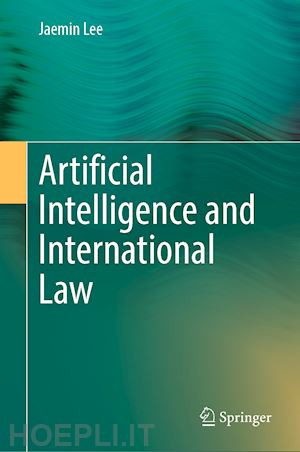
Questo prodotto usufruisce delle SPEDIZIONI GRATIS
selezionando l'opzione Corriere Veloce in fase di ordine.
Pagabile anche con Carta della cultura giovani e del merito, 18App Bonus Cultura e Carta del Docente
This book examines the timely issue of artificial intelligence (AI) and law. At this moment, AI is rapidly developing and being utilized in many different sectors. Meanwhile, the rise of AI raises complex questions and poses new challenges—new products and services involving AI will require new regulations and standards to minimize potential negative side-effects and maximize the benefits of this new technology, both within domestic law and international law. Thus, this book focuses on the impact of AI on international law and seeks ways to develop international law frameworks to adequately address the challenges of the AI era. In this context, new forms of inter-state conflicts and emergence of new subjects and objects of international law are discussed along with relevant up-to-date developments in major jurisdictions. Issues arising from the advent of AI relating to state sovereignty, state responsibility, dispute settlements, and north-south divide are also considered.
Jaemin Lee is currently Professor of Law at School of Law, Seoul National University in Seoul, South Korea. He obtained LL.B., LL.M. and Ph.D. from Seoul National University; LL.M. from Georgetown University Law Center; and J.D. from Boston College Law School. His major areas of teaching and research are public international law, international economic law and international dispute settlement. Upon graduation from the College of Law, Seoul National University in 1992, he joined the Korean Ministry of Foreign Affairs as a foreign service officer. His post in the ministry included deputy directorship of the Treaties Division and the North American Trade Division. Between 2000 and 2004, he practiced law with Willkie Farr & Gallagher (Washington, D.C.) as an associate attorney of the firm’s international trade group. From 2004 to 2013 he taught international law at School of Law, Hanyang University in Seoul. He has published articles and books (including book chapters) on various topics of international law and international dispute settlement. He is currently serving as a member of the Executive Committee of the Society of International Economic Law, and as a member of the Steering Committee of the ISDS Academic Forum. Previously, he served as president of the Korean Society of International Economic Law, and vice president of the Korean Society of International Law.











Il sito utilizza cookie ed altri strumenti di tracciamento che raccolgono informazioni dal dispositivo dell’utente. Oltre ai cookie tecnici ed analitici aggregati, strettamente necessari per il funzionamento di questo sito web, previo consenso dell’utente possono essere installati cookie di profilazione e marketing e cookie dei social media. Cliccando su “Accetto tutti i cookie” saranno attivate tutte le categorie di cookie. Per accettare solo deterninate categorie di cookie, cliccare invece su “Impostazioni cookie”. Chiudendo il banner o continuando a navigare saranno installati solo cookie tecnici. Per maggiori dettagli, consultare la Cookie Policy.